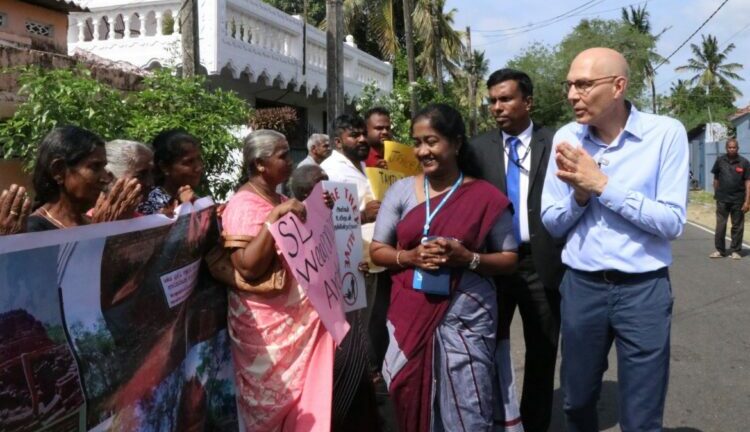By Kalinga Seneviratne
7 July 2025 (IDN) — Intimidated by the United States, the United Nations Human Rights Council (UNHRC) has been a hapless spectator while the genocide of Palestinians in Gaza has been happening in broad daylight, in front of cameras. During a four-day visit to Sri Lanka from 26 to 29 June, UNHRC’s chief Volker Türk from Austria was asked by local journalists about the situation. All he could offer was that it was “heartbreaking” and “distressing.”
However, by renewing its focus on Sri Lanka over allegations of war crimes, the UNHRC appears to lend weight to China’s internal campaign to redefine human rights as collective ‘development rights’ rather than individual rights. In July 2021, the UNHRC passed China’s resolution on the ‘right to development,’ which was supported by India but opposed by Western countries and Japan.
Türk’s visit to Sri Lanka reflects how the human rights agenda of the UN body is still influenced by the West—even after the Trump regime withdrew from the Council in February 2025, accusing it of bias against Israel over war crimes investigations in Gaza. The U.S. has also withdrawn funding from the UNHRC, which may limit its efforts to pursue action against Sri Lanka.
In a seeming attempt to assert its global relevance, the UNHRC has revived its 16-year campaign of pressure on successive Sri Lankan governments, using unproven allegations of war crimes in relation to the 2009 defeat of the Liberation Tigers of Tamil Eelan (LLTE). Had a Western country achieved such a military victory, it likely would have been celebrated.
The LTTE was banned even by India, the U.S., and the U.K. Yet when then-President Mahinda Rajapaksa, considered pro-China, eliminated the LTTE in a decisive battle in Mullaitivu on Sri Lanka’s northeastern coast in May 2009, thousands in the Tamil diaspora, especially in Canada, the U.K., France, and the U.S., mobilized politically. Over the 30-year civil war, they had developed a powerful propaganda network that shaped Western media narratives. As citizens of these countries, they exerted political pressure to launch a campaign at the UNHRC.
Claiming that 40,000 civilians were killed by the Sri Lankan army in the final stages of the war, the LTTE diaspora pushed for international accountability, branding it a war crime. Civilian casualties did occur, but the Sri Lankan government has consistently maintained that the LTTE used civilians as human shields. Although the 40,000 figure is still widely cited, UN sources later revised the number to around 7,000.
The LTTE hoped the diaspora could pressure western governments and human rights organisations to stop the army attacking the LTTE, claiming they were attacking civilians. Even the then Foreign Ministers of UK and France went to Colombo in April 2009 to meet President Rajapakse to call for a ceasefire, which was ignored.
Smarting from the snub, France and the UK, via the EU, mounted war crimes investigation procedures against Sri Lanka at the UNHRC after the Sri Lankan army eliminated the terrorist threat. To this day, the UNHRC’s so-called “core-group” on Sri Lanka is led by these two countries. Many Sri Lankans view the UNHRC as an organization that practices double standards, by accusing Sri Lanka of war crimes while ignoring much worse war crimes committed by NATO forces in Afghanistan, Iraq, Libya, and Syria.
Since the 2022 economic crisis, Sri Lanka’s economy has come under the control of the IMF, which has opened the door for western interference in Sri Lanka’s domestic affairs. Türk’s visit is a reflection of that.
While the initial concerns of UNHRC was about war crimes, Türk raised additional issues at a concluding press conference—issues more aligned with Western liberal agendas. These included acceleration legislation for same-sex marriage, repealing the Prevention of Terrorism Act (PTA), the Online Safety Act, and a proposed NGO bill that would limit foreign funding to prevent political destabilization.
Türk said these legislations unduly restrict the rights to freedom of opinion, expression, association, and peaceful assembly. Unfortunately, no Sri Lankan journalist asked him if he has given the same advice to Western governments that have been quick to legislate and clamp down on protests with regards to the Gaza genocide, labelling such protests as antisemitic.
In response to questions on same-sex marriage, Sri Lanka’s Justice Minister Harshana Nanayakkara stated: “These are controversial matters and to pass them into law could lead to sensitivities among the people of the country. We don’t wish to introduce laws that society will fight over.”
At the general election last year, all Tamil electorates, except one, voted for the Sinhala-led National Peoples’ Party (NPP) alliance—the current governing party—bringing into parliament some young articulate Tamil politicians. They have given full support to NPP’s desire to clean up corruption in the political system and bring socio-economic development to all communities across Sri Lanka irrespective of ethnic and religious divisions.
A key focus of Türk’s visit was to examine how Sri Lanka is proceeding with investigating missing persons during the civil war, which is what the pro-LTTE Tamil diaspora wants the UNHRC to focus on so that the eradication of terrorism in the country could be classified as a “war crime”. However, many Tamils within Sri Lanka have moved on and are focused on rebuilding the country and sharing its future development.
Ironically, the way Sri Lankan Tamils voted suggests alignment with China’s approach to human rights as primarily rooted in ‘development rights.’ In contrast, Türk’s emphasis on individual rights reflects a Western paradigm that may risk exacerbating division in a multi-ethnic society.


